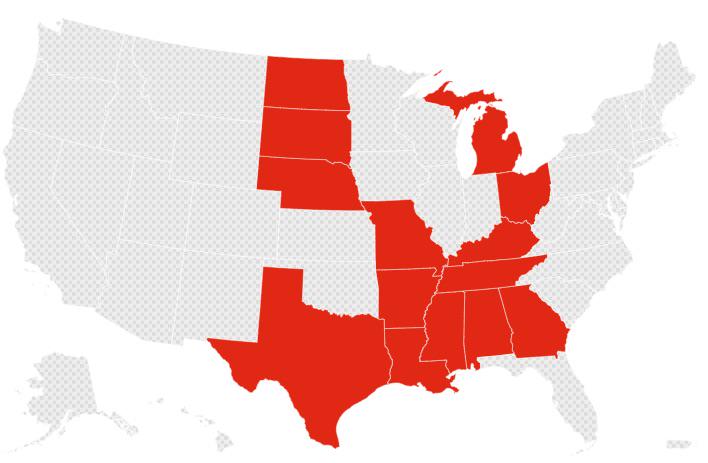Map of States Where Gay Marriage Would Be Illegal


Alex Cartwright
Senior Cartographer & GIS Specialist
Alex Cartwright is a renowned cartographer and geographic information systems specialist with over 15 years of experience in spatial analysis and data...
Geographic Analysis
What This Map Shows
This map illustrates the states in the United States where same-sex marriage would become illegal if the Supreme Court’s decision in Obergefell v. Hodges were overturned. In 2015, this landmark ruling legalized same-sex marriage nationwide, granting same-sex couples the same legal rights as heterosexual couples. However, the potential for this ruling to be reversed raises significant questions about the legal landscape for LGBTQ+ rights in America. Interestingly, while this map highlights the states that would outlaw same-sex marriage, it’s important to note that many states would continue to recognize these marriages due to the Respect for Marriage Act.
Deep Dive into the Legal Landscape of Same-Sex Marriage
The legal status of same-sex marriage in the United States has been a contentious topic for decades. The Obergefell v. Hodges decision was pivotal, effectively legalizing same-sex marriage across all states. However, this victory is precarious, particularly with the changing composition of the Supreme Court. Should Obergefell be overturned, states could revert to pre-2015 laws that either explicitly ban same-sex marriage or fail to recognize these unions.
Currently, there are several states with laws prohibiting same-sex marriage, either through statutes or constitutional amendments. States like Alabama, Arkansas, and Louisiana have such laws on the books. What's fascinating is that even in states where same-sex marriage could become illegal again, the Respect for Marriage Act ensures that marriages performed in states where same-sex unions are legal will still be recognized. This creates a somewhat complex legal scenario where individuals may have to navigate between state and federal laws regarding marriage rights.
Furthermore, the societal implications of overturning Obergefell are profound. The LGBTQ+ community has fought long and hard for recognition and equality, and the potential rollback of these rights could lead to a resurgence of discrimination and social stigmatization. According to a 2021 Gallup poll, 70% of Americans support same-sex marriage, which indicates a significant shift in public opinion. However, the legal framework is still vulnerable to change, reflecting the ongoing tension between evolving social norms and entrenched legal structures.
Regional Analysis
Looking at the map, we can identify regions where same-sex marriage could become illegal if Obergefell is overturned. The South, for example, includes several states that have historically resisted marriage equality. In states like Mississippi and Tennessee, not only are there laws against same-sex marriage, but there is also a broader cultural resistance that complicates LGBTQ+ rights.
In contrast, states in the Northeast and West Coast, such as California and New York, have been staunch supporters of same-sex marriage rights. Interestingly, even if Obergefell were overturned, these states would continue to uphold these rights, as they have enacted their own laws supporting marriage equality. This regional disparity highlights a significant divide in the United States regarding LGBTQ+ rights and acceptance.
Moreover, the Midwest presents a mixed bag. States like Illinois recognize same-sex marriage, while others, such as Indiana, have seen legislative efforts aimed at restricting marriage rights. The difference in legal frameworks across states is indicative of broader social and political attitudes toward the LGBTQ+ community.
Significance and Impact
The potential reversal of Obergefell v. Hodges carries significant implications not only for LGBTQ+ individuals but for society as a whole. The recognition of same-sex marriage has been a crucial step toward equality and acceptance, symbolizing a broader commitment to human rights. If states were allowed to ban same-sex marriage again, it could signal a regression in civil rights that could affect various aspects of life for LGBTQ+ individuals, from healthcare access to tax benefits.
Furthermore, the landscape of American politics continues to evolve, with many states actively debating issues related to LGBTQ+ rights. The future of same-sex marriage remains uncertain, and ongoing advocacy efforts are essential to protect and expand these rights. As society progresses, the legal framework must adapt to reflect the values of equality and inclusion. It’s crucial for advocates and allies to remain vigilant, as the fight for rights and recognition is far from over. Have you noticed how the cultural dialogue around LGBTQ+ rights has shifted in recent years? It’s a reminder of how important it is to stay informed and engaged in these discussions.
In conclusion, the map serves as a stark reminder of the ongoing struggle for equality in the United States. It prompts us to think critically about our legal systems and the societal values they reflect. As we move forward, let’s continue to advocate for a future where love and commitment are recognized and celebrated in every state, ensuring that no one has to fight for their right to marry the person they love.
Visualization Details
- Published
- August 22, 2025
- Views
- 44
Comments
Loading comments...